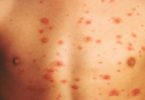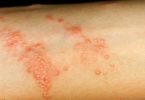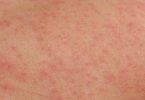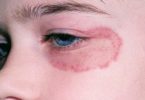What's in this article?
Stomatitis Overview
Stomatitis, a general term for an inflamed and sore mouth, can disrupt a person’s ability to eat, talk, and sleep. Stomatitis can occur anywhere in the mouth, including the inside of the cheeks, gums, tongue, lips, and palate.
Stomatitis is an inflammation inside of the mouth, usually a small sore or ulcer. It is not a stomach problem. “Stoma” is a medical term referring to a “mouth-like” opening.
Types of Stomatitis
♦ Canker sore: A canker sore, also known as an aphthous ulcer, is a single pale or yellow ulcer with a red outer ring or a cluster of such ulcers in the mouth, usually on the cheeks, tongue, or inside the lip.
♦ Cold sores: Also called fever blisters, cold sores are fluid-filled sores that occur on or around the lips. They rarely form on the gums or the roof of the mouth. Cold sores later crust over with a scab and are usually associated with tingling, tenderness, or burning before the actual sores appear.
♦ Mouth irritation. The irritation can be caused by:
♦ Biting your cheek, tongue, or lip
♦ Wearing braces or another type of dental apparatus, or having a sharp, broken tooth
♦ Chewing tobacco
♦ Burning one’s mouth from hot food or drinks
♦ Having gum disease (gingivitis) or other type of mouth infection
♦ Having hypersensitivity to certain things, such as foods or medicines
♦ Having certain autoimmune diseases affecting the mucosal lining of the mouth, such as lupus, Crohn’s disease, or Behcet’s disease
♦ Taking certain drugs such as chemotherapy, antibiotics, medications used for rheumatoid arthritis, or epilepsy medications
♦ Receiving radiation as part of cancer treatment
Transmission
Depending upon its cause, stomatitis may or may not be contagious. Herpes stomatitis is considered contagious. Children may be exposed through kissing, sharing food, or playing in close contact with others who have an active herpes infection, such as a cold sore . Aphthous stomatitis is not contagious.
Causes of Stomatitis
Herpes Stomatitis is caused by infection of the HSV1 virus in young children.
Aphthous stomatitis is caused by a variety of problems with oral hygiene or damage to mucous membranes. Some potential causes include:
♦ dry tissues from breathing through the mouth due to clogged nasal passages
♦ small injuries due to dental work, accidental cheek bite, etc.
♦ sharp tooth surfaces, dental braces, or retainers
♦ celiac disease (allergy to gluten)
♦ food sensitivities to strawberries, citrus fruits, coffee, chocolate, eggs, cheese, or nuts
♦ allergic response to certain bacteria in the mouth
♦ inflammatory bowel diseases
♦ autoimmune disease that attacks cells in the mouth
♦ HIV/AIDS
♦ weakened immune system
♦ deficiency in Vitamin B12, folic acid, iron, or zinc
♦ certain medications
♦ stress
Symptoms of Stomatitis
Stomatitis is characterized by pain or discomfort in the mouth and the presence of open sores or ulcers in the mouth. Herpes stomatitis may cause the following symptoms:
♦ fever , sometimes as high as 101–104°F (38.3–40°C), which may precede the appearance of blisters and ulcers by one or two days
♦ irritability and restlessness
♦ blisters in the mouth, often on the tongue or cheeks or roof of the mouth, which then pop and form ulcers (These ulcers are usually small [about one to five millimeters in diameter], grayish white in the middle, and red around the edges.)
♦ swollen gums, which may be irritated and bleed
♦ pain in the mouth
♦ drooling
♦ difficulty swallowing
♦ foul-smelling breath
Treatments of Stomatitis
Mouth sores generally don’t last longer than two weeks, even without treatment. If a cause can be identified, your doctor may be able to treat it. If a cause cannot be identified, the focus of treatment shifts to symptom relief.
The following strategies might help to ease the pain and inflammation of mouth sores:
♦ Avoid hot beverages and foods as well as salty, spicy, and citrus-based foods.
♦ Use pain relievers like Tylenol or ibuprofen.
♦ Gargle with cool water or suck on ice pops if you have a mouth burn.
For canker sores, the aim of treatment is to relieve discomfort and guard against infection. Try the following:
♦ Drink more water.
♦ Rinse with salt water.
♦ Practice proper dental care.
♦ Apply a topical anesthetic such as lidocaine or xylocaine to the ulcer (not recommended for children under 6).
♦ Use a topical corticosteroid preparation such as triamcinolone dental paste (Kenalog in Orabase 0.1%), which protects a sore inside the lip and on the gums.
♦ Blistex and Campho-Phenique may offer some relief of canker sores and cold sores, especially if applied when the sore first appears.





